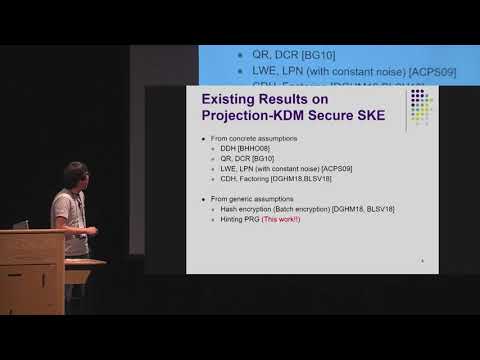CryptoDB
CCA Security and Trapdoor Functions via Key-Dependent-Message Security
| Authors: | |
|---|---|
| Download: |
|
| Abstract: | We study the relationship among public-key encryption (PKE) satisfying indistinguishability against chosen plaintext attacks (IND-CPA security), that against chosen ciphertext attacks (IND-CCA security), and trapdoor functions (TDF). Specifically, we aim at finding a unified approach and some additional requirement to realize IND-CCA secure PKE and TDF based on IND-CPA secure PKE, and show the following two main results.As the first main result, we show how to achieve IND-CCA security via a weak form of key-dependent-message (KDM) security. More specifically, we construct an IND-CCA secure PKE scheme based on an IND-CPA secure PKE scheme and a secret-key encryption (SKE) scheme satisfying one-time KDM security with respect to projection functions (projection-KDM security). Projection functions are very simple functions with respect to which KDM security has been widely studied. Since the existence of projection-KDM secure PKE implies that of the above two building blocks, as a corollary of this result, we see that the existence of IND-CCA secure PKE is implied by that of projection-KDM secure PKE.As the second main result, we extend the above construction of IND-CCA secure PKE into that of TDF by additionally requiring a mild requirement for each building block. Our TDF satisfies adaptive one-wayness. We can instantiate our TDF based on a wide variety of computational assumptions. Especially, we obtain the first TDF (with adaptive one-wayness) based on the sub-exponential hardness of the constant-noise learning-parity-with-noise (LPN) problem. |
Video from CRYPTO 2019
BibTeX
@article{crypto-2019-29909,
title={CCA Security and Trapdoor Functions via Key-Dependent-Message Security},
booktitle={Advances in Cryptology – CRYPTO 2019},
series={Lecture Notes in Computer Science},
publisher={Springer},
volume={11694},
pages={33-64},
doi={10.1007/978-3-030-26954-8_2},
author={Fuyuki Kitagawa and Takahiro Matsuda and Keisuke Tanaka},
year=2019
}

